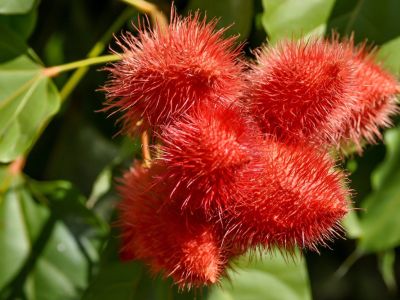What is Annatto?
Before you start growing achiote trees, you’ll want to learn a little bit about the fascinating annatto plant. So exactly what is annatto? The tree is native to South America. The scientific name of this small tree is Bixa orellana, while the common name is lipstick plant. Both annatto and achiote are terms used in the Caribbean to refer to the tree’s unusual seeds or the plant itself.
Annatto Achiote Information
The lipstick tree grows to 12 feet (4 m.) tall. It is an evergreen with a rounded canopy of green leaves. It graces your garden with its vivid pink flowers. Each of the ornamental flowers has five sepals and five petals. Overtime, the flowers wilt and seeds develop. They grow in scarlet, heart-shaped capsules or pods that look a little like chestnut burs, with many spikey bristles. These capsules split open when they are ripe. The seeds are inside in a layer of orange pulp. The seeds contain bixin, a bright red carotenoid pigment. The lipstick-red color is what gives the tree its common name. The seeds were once used to dye clothing, but these days serve mostly as a coloring for foods.
How to Grow an Anchiote Tree
If you are interested in learning how to grow an anchiote tree, first check your hardiness zone. These trees can only be grown in U.S. Department of Agriculture hardiness zones 10 through 12. Site is also very important. To have the best chance growing achiote trees, plant seeds or seedlings in a spot with full sun. Care of achiote trees is minimized if you select a site with organically rich, well-drained soil. Provide the trees regular irrigation to keep the soil moist. Other than irrigation and appropriate siting, care of achiote trees doesn’t require great effort. The lipstick plant does not have any insect or disease problems. These plants grow well as specimens. You can also plant them in groupings or hedges.
